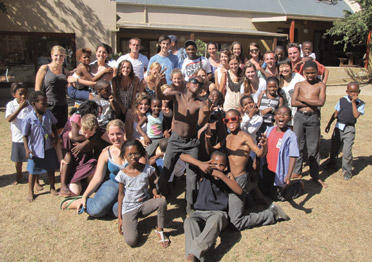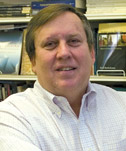PittMAP: Three Campuses/Three Continents
David Bartholomae, a professor of English and the Charles Crow Chair of Pitt’s Department of English, led the 2010-11 PittMAP program this past Spring semester. He reflects on his experiences and the program in this column.
From 1981 to 2006, Pitt was the host educational institution for Semester at Sea, a study-abroad program housed on a cruise ship. Each semester, the ship went halfway around the world. At sea, students were taking courses. When the boat docked, they would be taken by bus for local excursions. And then? Back to the boat.
 The 2011 PittMAP students visited James House, a nongovernmental organization in Hout Bay, South Africa, just south of Cape Town. James House is both a home for children whose parents can no longer take care of them and a center providing after-school and summer programs for children who live in Imizamo Yethu, a shantytown (or informal settlement). The PittMAP group, whose focus of study was global health issues, met with James House staff, and this photo was taken as the Pitt group was leaving.
The 2011 PittMAP students visited James House, a nongovernmental organization in Hout Bay, South Africa, just south of Cape Town. James House is both a home for children whose parents can no longer take care of them and a center providing after-school and summer programs for children who live in Imizamo Yethu, a shantytown (or informal settlement). The PittMAP group, whose focus of study was global health issues, met with James House staff, and this photo was taken as the Pitt group was leaving.When the University of Pittsburgh severed its ties with Semester at Sea, then-Provost James V. Maher established a committee to develop an alternative. The Pitt Multi-region Academic Program, or PittMAP, was created as a result of those discussions. I led the second PittMAP this past Spring semester, and our group of 22 students spent five weeks each in Buenos Aires, Cape Town, and Beijing. (The Spring 2012 program will take students to Buenos Aires, Prague, and Beijing.)
Perhaps the most significant advantage of PittMAP was the time we spent on the ground. We traveled by plane, not ship, and with five weeks at each site, we became something other than tourists. We joined a campus community, and we became part of the neighborhoods where we lived.
As a result, the students could pursue their interests in politics, science, sports, and the arts from one local culture to the next. They had their favorite coffee shops and bookstores. They found pickup soccer games, fencing matches, running trails, museums, jazz clubs, and concert venues. They made friends—some of them likely to be lasting—and partied with students from every corner of the globe.
The other distinctive feature of PittMAP for me was its focused curriculum. The trip was a study trip; everyone in the group was working on a common topic. In our case, we were studying issues and practices relating to global health, with particular attention to HIV/AIDS. Although the 22 students came from a range of backgrounds, the majority were science or premed majors. They were accompanied by three Pitt faculty members, including Peter Veldkamp, an assistant professor of medicine and director of education in the School of Medicine’s Division of Infectious Diseases; Svitlana Maksymenko, a lecturer in Pitt’s Department of Economics; and myself. Lauren Scott, a graduate student in the Graduate School of Public and International Affairs, came as resident adviser. Local faculty at each university we visited provided guest lectures, all focused on health-related issues.
So much of what we learned, however, we learned off campus, on the ground, through excursions enabled by our local providers. We visited hospitals, clinics, pharmaceutical laboratories, and biological research centers. We met with government agencies, physicians, nurses, and public health officials. And we hit some tourist stops along the way. We visited Iguazu Falls, climbed Table Mountain, and walked a piece of China’s Great Wall.
 David Bartholomae
David BartholomaeThe highlights for me included a visit to the cattle market in Buenos Aires (the Mercado de Liniers), an afternoon eavesdropping on a meeting of regional public health officials at the Ministerio de Salud, and a visit with Malena Araneo, a young woman who works for the World Bank and who provided, I think, a way for our students to imagine themselves working one day in a global environment.
In South Africa we visited one of Cape Town’s historic Black townships, Langa. The poverty was staggering; the living conditions unforgettable. And later in the visit, we had a presentation from a young Black PhD student in economics, Cecil Mlathsheni, who grew up in a township and whose research considered poverty and unemployment in the very township we had visited. We had a presentation by Stavros Nicolaou, a senior executive from Aspen Pharmaceuticals, telling the remarkable story of his successful struggle to bring affordable antiretroviral drugs to South Africa. Our classrooms at the University of Cape Town were located on the medical school campus, and our group attended lectures with second-year medical students.
In Beijing, we visited an organic farm on the outskirts of the city, toured studios and galleries of China’s contemporary art scene, met with the former director of the Chinese version of our Centers for Disease Control, and watched while one of our own student, Kerri Bell, received acupuncture as part of a presentation at Guanganmen, a hospital that features traditional Chinese medicine. None of us will forget the pharmacy in the hospital’s basement, where medicinal potions are concocted from herbs and roots and things that creep and crawl and fly. White-coated lab assistants worked at long wooden tables in a room with a thousand drawers. When we entered the production lab, with its steamers and pressure cookers, we ran into a wall of pungent smells. It was a scene out of Harry Potter.
I’ve been working with undergraduates since 1973. This was by far the most memorable and important and productive semester of my teaching career. I’m very grateful to have been a part of PittMAP. For faculty and for students, this is a once-in-a-lifetime opportunity. And you can find it through the Study Abroad Office at www.abroad.pitt.edu.
Other Stories From This Issue
On the Freedom Road

Follow a group of Pitt students on the Returning to the Roots of Civil Rights bus tour, a nine-day, 2,300-mile journey crisscrossing five states.
Day 1: The Awakening
Day 2: Deep Impressions
Day 3: Music, Montgomery, and More
Day 4: Looking Back, Looking Forward
Day 5: Learning to Remember
Day 6: The Mountaintop
Day 7: Slavery and Beyond
Day 8: Lessons to Bring Home
Day 9: Final Lessons

